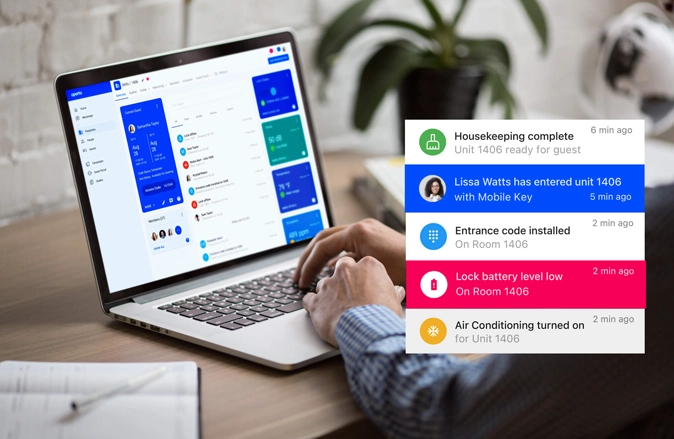10 Emerging Hotel Industry Trends to Follow for Success [2023]

“The key to success in the hotel industry still lies in offering guests that warm, personalized experience. But being able to do this while offering value for money means turning to technology.”
So said John Ryan, Managing Director of The Ardilaun, when speaking about how the latest hotel industry trends are affecting business.
And it’s true—guests increasingly expect technology to give them personalization and control over their stays. They want to have more meaningful interactions with your staff and to spend less time lining up at the front desk.
And technology’s influence doesn’t stop there. In this article, we explore the most important hotel industry trends, how they’re changing the guest experience, and how they’re impacting your operations.
Keep an eye out for insights from industry experts, how to upgrade to a digital access system without changing your locks, and how to use ChatGPT to improve your marketing efforts.
Start every stay off right. Download your free Airbnb welcome book template.

Hotel guest expectations: Control and choice
So much has changed since the pandemic, it’s worth taking a fresh look at what today’s travelers want from their hotel experience and how this can inform your hotel guest engagement strategy.
Research into the US tourism industry shows that millennials travel more than other generations, spending 35 days per year on a vacation, compared to 26 days for Generation X; 27 days for Baby Boomers; and 29 days for Generation Z.
This cohort of travelers has grown up with technology, and see its advantages for providing control and choice over their travel experience.
As such, tech innovations like contactless check-in and in-app messaging with hotel staff are no longer novel add-ons. Instead, they’re key to giving guests the experience they’re looking for.
Let’s take a look at the main trends in hotel guest expectations and what hoteliers can do to meet them.
1. Hotels will need to be tech-enabled
With high labor costs and energy expenses still impacting the hotel industry, becoming tech-enabled is increasingly important.
This is because automating manual tasks like managing bookings, overseeing check-in, and scheduling cleans, reduces your teams’ workloads and increases operational efficiency. And this in turn impacts your staffing needs, which we look at below.
What’s more, as John explained, “Technology is key not only to driving your revenue, controlling your cost structure, and growing your team, but to improving the guest experience.”
Modern travelers want the convenience of having information at their fingertips and the level of personalization offered by vacation rentals. They’re familiar with tech that provides them with everything they need in-app, and they’re looking for the same digitized experience when they stay at your hotel.
By bringing guest, team, and smart device management into one centralized location, you can further save time and reduce costs by streamlining your solutions so your team can use one dashboard to manage everything from check-in to smart thermostats.
2. Technology will solve labor shortages
Ever since the pandemic, labor shortages have been putting pressure on front desk teams. And as Curtis Crimmins, Co-Founder of Roomza, said when we spoke to him, “We all need to wake up to the reality that there’s not a group of applicants that we’ve missed somewhere; nobody else is coming.”
Fortunately, when managing absences and overstretched staff, technology presents a solution: Automating manual tasks (such as checking people in and managing access) reduces your dependency on staff.
And this frees up your remaining team members to have more genuine interactions with guests. As John says, “Guests like the idea of a digitized check-in, but in my experience, the warm and friendly welcome is what they desire most.”
Prague Residences provides an example of what this looks like in practice. Having reduced its front desks from four to one, the short-term rental (STR) and hotel operator could scale its business while still providing a great experience to each guest. Guests now check in on their mobile phones, avoid the front desk entirely, and contact staff only for personalized recommendations and requests.
This was made possible with Operto Guest. With our automated self-check-in software, guests:
- Receive an automated message after booking that shares a branded web app with key information about their stay
- Verify their identity and complete a security deposit payment to check in digitally
- Receive an automatically generated mobile key that activates at the time of check-in
3. Technology will make mobile access more affordable
Historically, only large hotel chains could afford to offer digital access because of the expense of switching to digital locks and of developing the software that supports the digital check-in process. These costs include the hardware and installation fees, recurring maintenance, and added expenses if doors no longer meet fire code requirements.
These days, technology presents an alternative—a way to keep existing hardware while upgrading your access systems.
You can insert the Operto Boost Smart Chip into your existing keycard locks in minutes, instantly giving them Bluetooth functionality. As a result, you can offer mobile check-in and gain access to Operto’s range of automation and guest experience tools (more on this later).
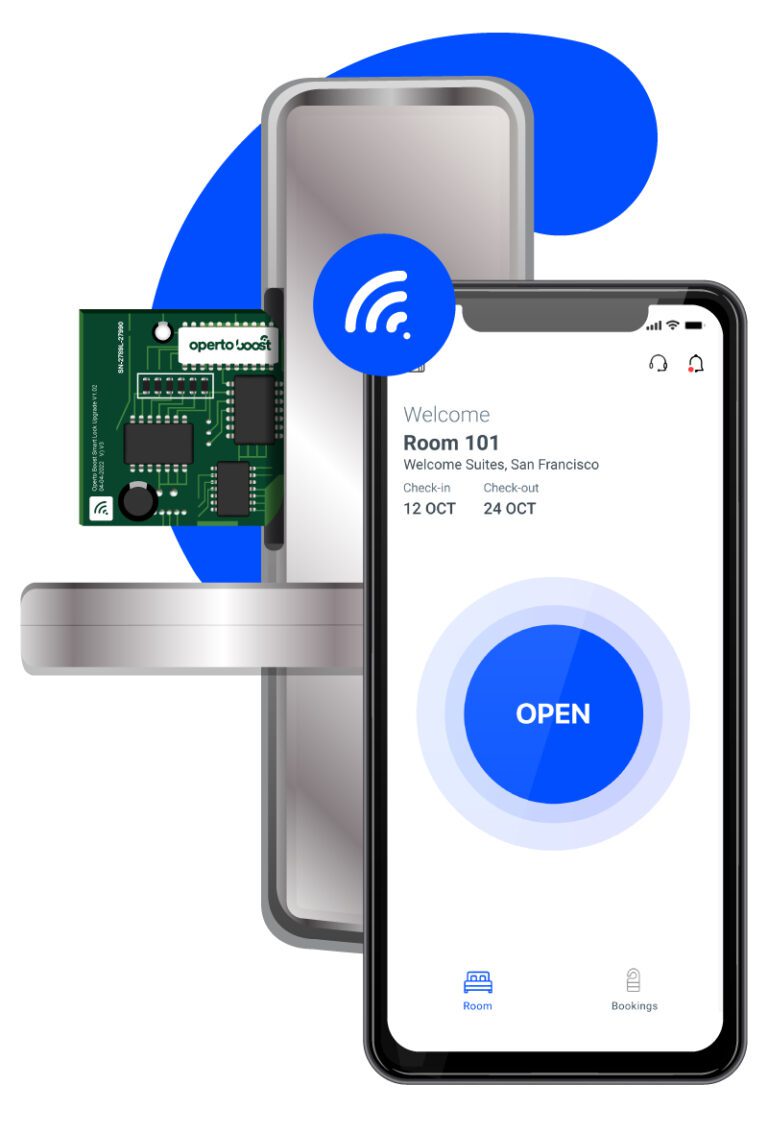
Operto Boost gives locks BLE functionality without you needing to change the hardware
4. Guests expect autonomy throughout their stay
The STR and hotel markets are merging and all property types are promoted on the same booking channels. But guests aren’t interested in types of stay, only their stay experience. So guests expect the same autonomy they get at an STR as they benefit from the luxury service you provide at your hotel.
They look to check in independently and avoid any lines at the front desk. Then they want to access useful insights to enjoy their stay without having to rely on your staff (in the next section, we explore how to make this possible with digital guidebooks.
With self-service technology, guests can:
- Digitally check in and access their room with mobile key.
- Easily answer their own questions on arrival, internet access, and check-out policy.
- Book facilities, excursions, and make special requests from their smartphone.
- Find lost property: Operto Teams integrates with Bounte so guests can independently organize the delivery of what they left behind.
5. Travelers expect a low-contact guest journey
When it comes to low-contact technology, it’s clear that what started out as a health and safety measure has transformed into an ongoing guest expectation.
Guests look to enjoy hotel facilities in the company of family and friends with as little disruption as possible. And recent research shows that 73% of guests want hotels to offer tech that minimizes interaction with hotel staff and other guests.
Digital guidebooks are a great way to increase guest independence. In one place, you can share and regularly update information about how to arrive, parking, WiFi, menus, amenities, and the local area.
Inside Operto Guest, you can also include links to personalized add-on services in the form of smart buttons. With a few clicks, your guests can request room service, hire equipment, or book a local tour.
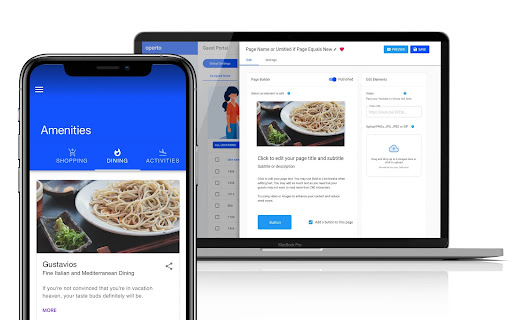
6. Guests will expect in-room personalization
The huge variety of unique experiences and customizable features provided by STR hosts mean guests are now seeking increased levels of choice in their hotel stays. For example, they might want specific toiletries or minibar items.
Roomza is a hotel brand that was able to capitalize on this trend. By saving money through automating check-in and reducing front desk staff, they can offer more choice to guests. Before they arrive, customers can select their preferences, from the type of pillow they’ll sleep on to the brand of coffee they’ll drink.
With a task management platform like Operto Teams, you can make it operationally easier to fulfill these requests. For example, if a guest sends a message asking for extra towels before they arrive, you can instantly create a task for one of your staff.
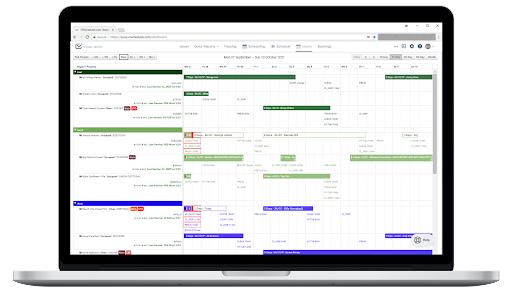
Align, centralize, and tweak your employees’ schedules inside Operto Teams
7. Technology will drive customer loyalty
By offering higher levels of personalization and using technology to log customer preferences, hotels can grow customer loyalty. Here’s how:
- Customer relationship management (CRM) tools can store data about guests in a centralized location.
- These can be used for loyalty programs with customized rewards based on the guest’s favorite amenities (like spas and gyms) and preferences (e.g. late check-out)
- You can use a guest experience platform like Operto Guest, which includes two-way messaging, to find out about these preferences and to increase pre-stay brand engagement by highlighting personalized offers and discounts.
8. Providing for remote workers is increasing important
Increasing numbers of travelers are looking to book longer-term stays in which they combine business with travel and explore a new setting while they work. But attracting these “bleisure” guests, who typically book vacation rentals because of their amenities and marketing approach, necessitates a shift in strategy.
Here are some things that will draw in remote workers to your hotel:
- A stable Wi-Fi connection. Provide an ethernet cable as this is a requirement of many remote-work companies and be sure to verify the speed of your connection when you list on OTAs.
- A dedicated workspace. Include ergonomic chairs, a large desk, and a range of USB and USB-C outlets for different devices.
- Strong social media marketing. Post images that are relevant to bleisure travel and paint a picture of what it’s like to work at your hotel. We offer more tips on social media, below.
- Discounts for longer bookings. Set up a monthly discount on OTAs and partner with local co-working spaces to offer reduced rates for guests throughout their stay.
9. Sustainability will be more important than ever
In our recent study, over 80% of travelers described that they would pay more for an eco-friendly stay. Creating sustainable practices allows you to attract this growing demographic of guests while managing increasing operational costs by saving money on resources like energy and water.
To optimally showcase your eco-friendly activities, you should focus on:
- Obtaining recognized green certifications such as LEED (Leadership in Energy and Environmental Design), Green Key, or Green Globe
- Being transparent about how you implement green initiatives in your listings, on your website, and across social media platforms
- Collaborating with local environmental organizations through sponsorship or joint events
10. AI tools like ChatGPT will inform online marketing efforts
You might notice other hotels building a presence on social media and consistently sharing new blog content, allowing them to build a recognizable brand and a base of loyal guests.
What’s also exploded on the scene is AI technology like ChatGPT. You can use this artificial intelligence tool to create strategies, content calendars, write in-depth posts, and create social media captions in minutes.
Here are some prompts you can use to save time on your marketing:
- Give me 5 blog ideas to attract guests to a hotel in [LOCATION]
- Give me 10 blog ideas that will attract [DEMOGRAPHIC INFORMATION e.g. millennials] to a hotel in [LOCATION]
- Give me 5 social media posts for a hotel in [LOCATION]
- Write an Instagram caption for a hotel with [FEATURE]
- Give me a list of hashtags for a hotel in [LOCATION] with [FEATURE]
- Create a social media strategy for a hotel in [LOCATION] looking to attract [DEMOGRAPHIC]
You can also ask ChatGPT to write content in a particular tone or for a particular audience, as in the example here.
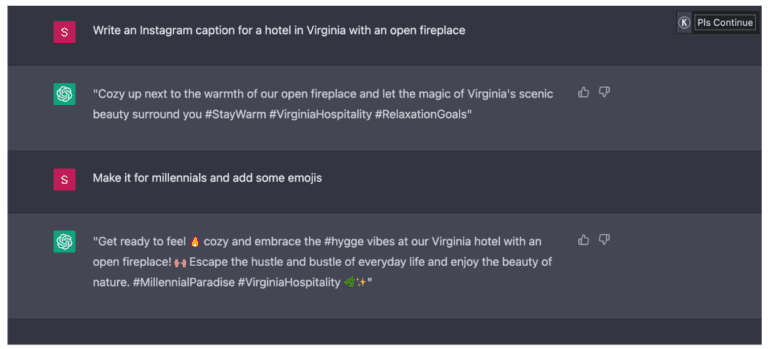
It’s best to add follow-up prompts rather than sending ChatGPT a lot of information in one message
Capitalizing on the latest trends
Becoming tech-enabled allows you to remain competitive in the face of labor shortages and changing guest expectations.
With the right tools, you can offer guests increased personalization and autonomy and increase the number of meaningful interactions people have with your staff. At the same time, you can also reduce your teams’ stress and improve operational efficiency.
Here are some ways to get started and capitalize on recent trends:
- Offer mobile check-in by upgrading your locks
- Increase guest autonomy with digital guidebooks and self-service technology
- Allow guests to request personalized amenities and perks
- Upgrade your Wi-Fi and shift your marketing to attract remote workers
- Use ChatGPT to regularly share social media and blog content
- Showcase your advancements in sustainability
If you’re running a boutique hotel, Operto makes tech solutions accessible to your guests, team, and business.
By upgrading your locks with Operto Boost, you can keep your existing hardware as you offer streamlined mobile check-in, unlock access to a centralized suite of guest experience and automation tools, and improve how you manage the challenges presented by labor shortages and changing guest expectations
Frequently asked questions about the hotel industry trends
Why do you need to follow hotel industry trends?
Staying up to date with new trends in the hospitality business allows you to spot ways to remain competitive by improving operational efficiency, creating more upsell opportunities, and meeting the changing needs of your guests.
You use the latest trends to identify new marketing opportunities and use hotel technology to deliver an enhanced customer experience. With Operto, for example, you can save your team time and give guests increased autonomy with mobile check-in and a digital guest journey.
What does the future of the hotel industry look like?
With the rise of business travel and remote work, efficient, digitized guest experiences are becoming more popular. These provide a way to combat labor shortages and deliver increased personalization and autonomy. It’s likely the future of the hotel industry involves contactless check-in and the use of tech that gives guests better access to information and communication tools.
Want an operations tool that's smooth and flexible?
